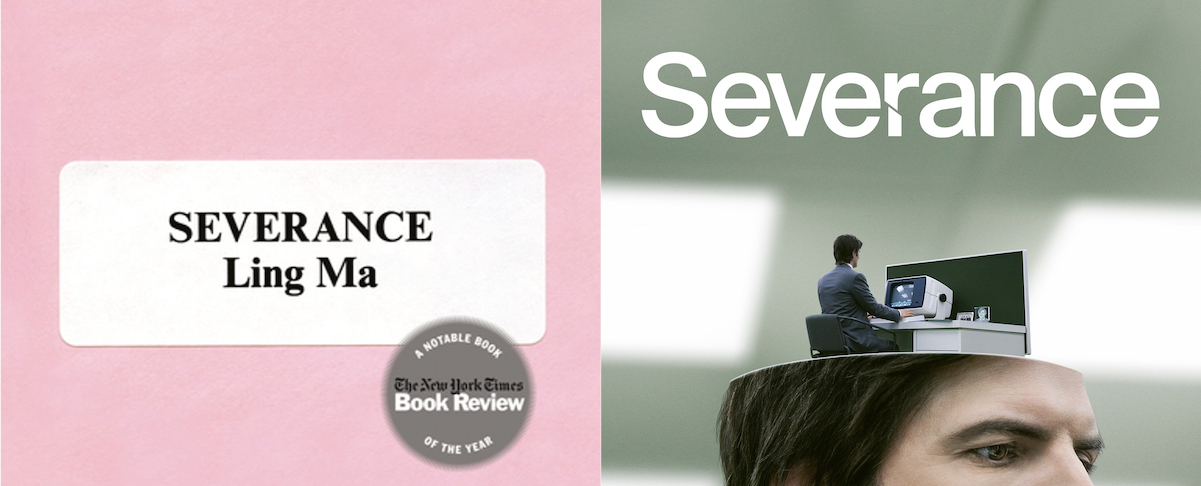Which is Better, ‘Severance’ or ‘Severance’? The Answer is ‘Severance’

This article contains minor spoilers for Severance by Ling Ma and Severance on Apple TV+. They shouldn’t interfere with your enjoyment of either one, but you’ve been warned.
After the back-to-back success of Severance by Ling Ma in 2018 and Severance on Apple TV+ in 2022, you could be forgiven for thinking the series was based on the novel. Apple’s Severance tells the story of Mark, Helly, Irving, and Dylan, four office workers who work on the “severed” floor of Lumon Industries. Mark and the others have had their workplace memories surgically severed from the rest of their brains, leading to the formation of entire new personalities at Lumon. Mark has no idea who his outside self, or “outie,” is; likewise, once he leaves work, he becomes someone who has never met his “innie.”
Ling Ma’s novel, on the other hand, is about a fungal infection that wipes out humanity, reducing people to mindless shells, called the “fevered,” who go through the motions of their previous lives. Candace, a former book production worker, hooks up with a band of survivors heading to a mysterious facility where they hope to start a new life.
Both the novel and the series are incredibly good. Neither of them have anything obvious in common with the other except the fact that they use sinister corporate jargon as their title. And yet, here I am, compelled to write about them both side by side.
Severance points to the strange marriage of capitalism and spirituality
Covid, and the extended quarantines it spawned in many parts of the world, changed the way we look at office culture. Those of us who were lucky enough to be able to work from home did so, and found that our offices didn’t crumble into dust without our butts warming our Steelcase-fabricated chairs. Corporate culture leans hard into lofty idealism to keep its workers in line, calling them family and pronouncing their work a sacred vocation. The brief loosening of office workers’ leashes during Covid gave us the space we needed to see the rhetoric for the lie that it is.
Of course, we were disgruntled with office culture long before Covid. Ma’s novel was published two years before the pandemic began, and director Ben Stiller read the first Severance script five years before the show’s premiere. It’s no surprise that both works—among countless others written and developed around the same time—picked up on the toxicity of corporate life.
And for two unrelated works, there are some surprising commonalities. The most obvious one is their depiction of office life. The severed workers effectively live their entire lives in Lumon’s offices. The moment they step into the elevator to go home, they “wake up” the next day on their way back down to their cubicles. They’ve never seen the sky, although they can imagine what it looks like. They know the outside world exists, but they can never experience it.
In Ma’s novel, Candace leaves her apartment and moves into her office after most of New York City succumbs to the infection. She ostensibly does it for the wifi, so she can keep updating her photojournal of the decaying city, but on a deeper level, she can’t let her job go.
Then there’s the theme of bodies as commodities. The innies in Apple’s Severance are literally slaves, forced to live and work at Lumon against their will. The twist, of course, is that it’s their own outies who have imprisoned them there. In Ma’s novel, Candace is imprisoned as soon as the leader of the survivors, Bob, finds out she’s pregnant, in a biting commentary on the way that Western culture tries to commodify and control Asian women’s bodies.
The parallel I found really striking between the two works, though, were their religious undertones. Both works shine an uncomfortable light on the way that capitalism and religion have become intertwined, and often interchangeable. In the Apple series, we gradually find out that Lumon isn’t just a company protecting sensitive trade secrets. It’s a full-on cult, with middle managers who erect shrines in their living rooms and a CEO who wants to make the entire world “children” of the company’s founder by severing their work selves.
Likewise, Ma’s novel is steeped in religious themes. At her book production company, Candace is in charge of Bibles, overseeing the design and manufacture of endless novelty and gift editions. She doesn’t particularly want to be doing Bibles, but it’s the job she’s got, and there’s no shortage of work to be done. She remembers how her mother was active in their local church, and burns offerings of money and skin cream for her parents after they die. After the apocalypse, she finds out that the leader of the band of survivors, Bob, is a religious fanatic who (spoiler warning!) wants them all to live in a shopping mall. Everywhere Candace turns, religion and commerce mutually reinforce each other.
Which should you try first: Severance or Severance?
Both of these works hit on the noxious fact that capitalism tries to convince us to let work and consumption take over our entire identities. The severed live their whole lives performing rote tasks while the fevered become trapped in rote actions. Both stories are chilling because they hit so close to home—and both are very well executed. Severance doesn’t have quite the same urgency as Severance, while Severance has a slow burn that Severance lacks; on the other hand, Severance manages to get into the psychology of its characters more than Severance does. The point is, they’re both great.
So if you want to explore the unbearable, all-encompassing dystopia that corporate culture has become? Go for Severance, but be sure to give Severance a try, too.
(featured image: Picador/Apple TV+)
Have a tip we should know? [email protected]
